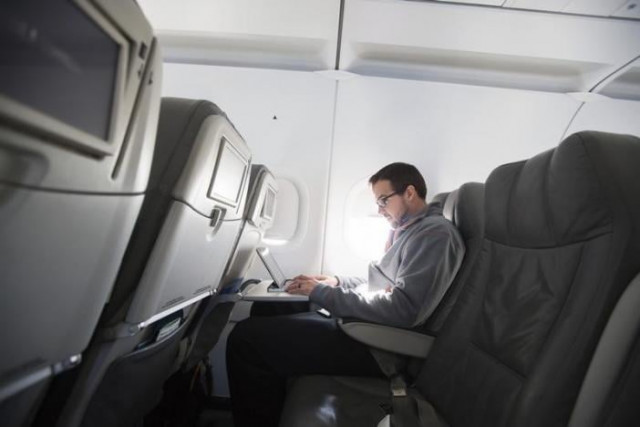5 reasons the US ban on in-flight electronics is downright stupid
The ban has also confused security experts questioning reasoning behind decision

PHOTO: REUTERS
The ban, which was adopted by the British government today, has also confused security experts who are questioning the reasoning behind the decision.
"Frankly, I'm amazed by this measure," said Anthony Glees, director at the University of Buckingham’s Centre of Security and Intelligence Studies. "To me it makes no sense whatsoever in security terms; my guess is that its significance is wholly political... What countries need to keep them safe is security-informed activity, not politics-informed activity."
UK issues laptop, tablet flight ban after US warning
Glee believes that the ban may work against the welfare of the America. "It's not good for the security of the US if militants get the idea that the administration does not know what it is doing, and that the US intelligence community is rubbish. That's a really big danger, to all of us in the West."
There are many unanswered questions regarding the order, we look at five of the most obvious reasons the ban has attracted curiosity.
Militants can come from anywhere not only the Middle East:
The ban appears as a follow up to the Trump administration’s travel ban, considering the 10 airports in the list are in Muslim-majority countries.
“Indeed, it's hard to disassociate the ban from the Trump administration's recent executive orders designed to prevent immigrants from entering America,” Glee adds.
According to Dr Pere Suau-Canchez, a lecturer in airport management at the University of Cranfield, "singling out specific countries ignores the fact that terrorist cells are spread through the world and that airlines provide connectivity indirectly via hubs.”
"Tickets can be bought separately, so a traveller would not appear as a connecting passenger. Hence a potential terrorist could start their trip in one of the banned countries, connect in an airport located in a third country and arrive at the US with the electronic device," he explains.
US bans large electronics from 10 airports, mainly in Middle East
"Presumably, dedicated terrorists could also still plot an attack on an airplane heading to the United States - using a laptop or any other device - from a number of other international locations not subject to this policy," said Evan Hill, a writer and research based in the Middle-East.
Electronic devices do not include Smartphones:
The ban restricts any electronic device larger than a cell phone from boarding the plane – which is a little confusing since smartphones are often used in carrying out attacks.
"I could understand a ban on all electronic devices, including mobile phones, because [in theory] there is nothing in a laptop that isn't in a smartphone and as a means of providing an electric spark that could trigger an explosion, anything with a battery and particularly with a flash can do the trick so smartphones are a particular problem," said Dr Suau-Canchez.
Screening cargo sounds more important:
Any potentially threatening device in the cargo area of the plane can pose a much bigger threat.
According to Glee, where cabin baggage can be methodically X-rayed, "the chances of getting a bomb on a plane via baggage and into the hold are surely greater than on a person."
Privacy?
The ban also ignores privacy concerns while handing over electronic devices, carrying personal and business information, in to unknown hands.
Laptops, tablets on airplanes: what's the threat?
In a tweet, Hill pointed out that “the “Muslim laptop ban” will separate journalists, activists and everyone else from their personal data”.
"Anyone with data they'd like to protect should practice a few fairly simple security habits: put anything truly sensitive in an encrypted external drive, encrypt your computer, use strong and varied passwords, use two-factor authentication, and put everything you don't need in your hands in the cloud," Hill advises.
Profiling passenger may be more apt:
Suau-Sanchez insists that “having devices on a person may mean they’re open to more thorough searches and profiling”.
"Passenger profiling allows to identify the potential risk and thread of individual passengers. In this regard, systems like with Israeli airport security, which is centred around the human factor and preliminary checkpoints, have been more successful than traditional systems," he adds.
This article originally appeared on Forbes.



















COMMENTS
Comments are moderated and generally will be posted if they are on-topic and not abusive.
For more information, please see our Comments FAQ